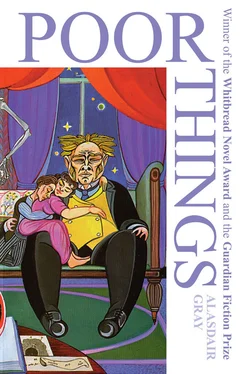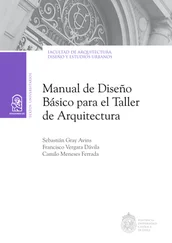“Indeed it is, Mrs. Wedderburn,” cried Doctor H., “for most people, if not for Mr. Astley. Even he is a child of God though he won’t admit it — but you are especially so. The faith, hope and charity shining from your clear eyes guarantee it. Pray tell us, Mrs. Wedderburn, how you perceive Our Father Which Art in Heaven.”
Since my quack with the outchatel in the German park I had not had a chance to talk about the great big ordinary queer things because Wedder finds them a torture. And now these two clever men wanted me to talk about EVERYTHING! Out the words tumbled.
“All I know about that god,” I said, “is what I was told by my own God — by my guardian, Godwin Baxter. He said god is a handy name for all and everything: your top-hat and dreams Mr. Astley, sky boots Bonnie Banks o’ Loch Lomond bortsch me molten lava time ideas whooping-cough ecstasies of wedded bliss my white rabbit Flopsy AND the hutch she lives in — everything named in every dictionary and book there has ever been and ever could be adds up to god. But the wholly-est bit of god is movement, because it keeps stirring things to make new ones. Movement turns dead dogs into maggots and daisies, and flour butter sugar an egg and a tablespoonful of milk into Abernethy biscuits, 18and spermatozoa and ovaries into fishy little plants growing babyward if we take no care to stop them. And movement causes pain when solid bodies knock into living ones or living ones knock each other, so to stop us getting knocked dead before life wears us out we have generated developed evolved acquired invented matured gained and grown eyes and brains to let us see knocks coming and dodge them. And how beautifully the whole godly clamjamfrie works! I thought of improving the port of Odessa three days ago and could not see where to start. I know things were not always thus. I have read The Last Days of Pompeii and Uncle Tom’s Cabin and Wuthering Heights so know that history is full of nastiness, but history is all past so nowadays nobody is cruel to each other, just stupid sometimes when they get into betting-shops. Punch says only lazy people are out of work so the very poorest must enjoy being poor. They also have the consolation of being comic. I know of course that bad accidents sometimes happen, but life goes on. My parents were killed in a train crash but I cannot remember them so I hardly ever weep. Anyway, they must have been old, so nearly worn out. I have been told I lost a baby somewhere else, but I know my little daughter is being cared for. My guardian looks after sick dogs and cats without being paid so a lost little girl is bound to be safe. What bitter truth were you talking about, Mr. Astley?”
While I spoke a strange thing happened. Both men were staring at my face hard harder hardest, but Mr. Astley leaned closer and closer as he did so while Dr. H. leaned further and further back. Yet when I stopped speaking Mr. Astley did not reply, and Dr. H. said in a low voice, “My child, have you never read God’s holy Bible?”
“I am nobody’s child!” I told him sharply, but of course I had then to explain about the amnesia. When I had done it Dr. H. said, “But ch! — Mrs. Wedderburn, your husband seems to be a devout Christian. Has he given you no religious instruction?”
I told him I could hardly get a word out of poor Wedder since he went biblical. Dr. H. gazed silently at me until Mr. Astley said in a strange voice, “Dr. Hooker, do you intend to instruct Mrs. Wedderburn in the doctrines of original sin and eternal punishment for worldly transgressions?”
“No sir,” said Dr. Hooker shortly.
“Mrs. Wedderburn,” said Mr. Astley, “your guardian’s account of the universe is one to which neither of us object. The bitter truth I spoke of is a statistical matter — a detail of political economy. I was joking when I called it a faith — I said that to annoy Dr. Hooker. I am a phlegmatic fellow, so his American exuberance annoyed me. But we are both glad you find the world a good and happy place.”
“Shake,” said Dr. H. quietly, and held out his hand, and Mr. Astley shook it.
“I like seeing you two gentlemen friendly,” I told them, “but I feel you are in a conspiracy to hide something from me, and I am going to find out what it is. Shall we take a walk on deck?”
So I strolled on deck with them. A lovely morning. Now I am going to have lunch in our cabin with my Wedder, followed by an afternoon of cuddles. I wonder what Dr. H. and Mr. A. will talk about over dinner this evening?
* * * * * * * * * * * * * *
“What brought you to Odessa, Astley?”
“Beetroot, Dr. Hooker. My firm refines and sells cane sugar but German beet sugar may cheapen that unless we compete with the German product. But British farmers refuse to grow sugar-beet — they get more for other root crops. To undercut the Germans we need sugar-beet from farmers who work for Asiatic, not European wages, hence my visit to Russia. We also need a port linked to international shipping lanes, hence my visit to Odessa.”
“So the British Lion is forging trade links with the Russian Bear?”
“Too early to say, Dr. Hooker. The Russians offer us land and labour to build a sugar refinery on very good terms, but the soil and climate may not be best for sugar-beet. What brought you to Odessa? Does your federation of Bible societies plan to convert the followers of the Russian Orthodox Church?”
“Nope. Fact is, I have retired from missionary work. I came to China fifteen years ago by the straight Pacific line. I am wending my way home to the Land of the Free by the pleasantest and most roundabout route I can find.”
“Siam, India, Afghanistan?”
“Not quite.”
“The Outer Mongolian and Turkestan or Siberian routes are not exactly pleasure trips either, Dr. Hooker. You must have needed an armed escort for much of the way. Did the United States government pay for that or the American chambers of commerce?”
“You are a deep and dangerous man, Astley!” said Dr. Hooker, chuckling a bit. “I would rather be up against ten wily oriental warlords than a single Englishman of your stamp. Yes, a few far-seeing American citizens asked me to report on some aspects of central Asia, the world’s largest sink of unclaimed heathendom. Can you blame us? Britain has carved up the rest of the planet. Less than two years ago you grabbed Egypt from the French — and from the Egyptians.”
“We needed their canal. We paid them for it.”
“You also shelled Alexandria, our next port of call.”
“They were arming it against us and we needed their canal.”
“And now British regiments are fighting the Dervishes in the Sudan.”
“We cannot tolerate religions which urge the natives to rule themselves. Home rule would disturb trade and our smooth running of the canal.”
Up piped Bell Baxter: “What are natives, Mr. Astley?”
I had been keeping quiet, hoping to learn things, but “undercut”, “report on aspects”, “unclaimed heathendom”, “carved up the planet”, “grabbed Egypt”, “home rule”, “disturb trade” made no sense to me. However, “natives” sounded like people.
“Natives,” said Mr. Astley carefully, “are people who live on the soil where they were born, and do not want to leave it. Not many English can be regarded as natives because we have a romantic preference for other people’s soils, though we are very loyal to our old schools and school friends, our regiments and businesses. Some even feel loyal to the Queen, who is a very selfish old lady.”
Читать дальше












